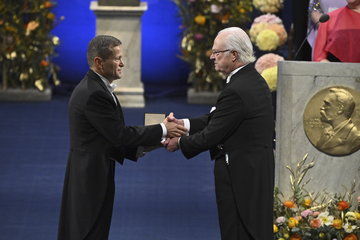On the trail of human evolution
Timothy George Bromage and Michael Tomasello are awarded the Max Planck Research Prize this year.
This year’s Max Planck Research Prize endowed with 750,000 euros goes to Timothy George Bromage of the New York University College of Dentistry and Michael Tomasello of the Max Planck Institute for Evolutionary Anthropology in Leipzig. "The Alexander von Humboldt Foundation and the Max Planck Society thereby recognize two scientists who have made a significant contribution towards improving our understanding of the evolution of mankind," said Max Planck Society President Peter Gruss. "They bridge the gap between evolutionary biology and the study of culture and the human sciences."

Timothy Bromage has been a professor at the New York University College of Dentistry since 2004. His work includes a study in Malawi in southeast Africa aimed at deciphering details of the living conditions of early man from the structure of teeth and bones. An examination of anatomical finds at the micro-level, something which very few researchers have so far attempted, has proven to be particularly revealing. Bromage hopes to resolve some difficult questions such as whether bones and teeth belong to a male or female individual, and whether, during their lifetime, there were one or two rainy seasons per year. In the course of his work he has discovered a new mechanism by which to determine the speed of growth and life history of the individual from the laminar structure of their bones. The award will support Bromage in making the examination of bones and teeth an even more important tool in the study of human evolution. He is currently creating a database with which to compare the metabolism and bone structure of present-day apes and humans. His scientific work has earned him awards from among others the National Science Foundation (2009, 2007), the National Geographic Society (2008) and the National Institute of Health.
Psychologist Michael Tomasello, who was born in Bartow, Florida, is a Director at the Max Planck Institute for Evolutionary Anthropology in Leipzig where he heads the department of Comparative and Developmental Psychology. Working on the frontier between natural sciences and the human sciences, his primary interest lies in the origins of language and the cultural evolution of mankind. In numerous empirical studies of small children and primates, Tomasello is investigating the cognitive abilities that distinguish man from other highly-developed primates and which have enabled us to create a long-lasting culture. He is convinced that one key element is man’s ability to see things from the perspective of his fellows and imitate their behavior and associated intentions. The awards received by Tomasello in recognition of his scientific work include the Fyssen Foundation Award for Cognitive Sciences (2004), the Jean Nicod Prize for Philosophy and Cognitive Sciences (2006), the Oswald Külpe Prize of the University of Würzburg (2009) and the Hegel Prize presented by the City of Stuttgart (2009). As a scientific host active in the Humboldt Foundation network, he has worked with several Humboldt research fellows, as well as with Sofja Kovalevskaja Award winner Brian Hare.
The Max Planck Research Prize, the international research award presented by the Alexander von Humboldt Foundation and the Max Planck Society, is funded by the German Federal Ministry of Education and Research. The objective is to support German and foreign scientists working in particularly promising fields. The award is shared each year by two scientists, one working in Germany and one working abroad, who have already achieved international recognition and who, through the medium of international cooperation, are expected to attain further cutting-edge achievements. Applications for the award are invited on a rotating basis in selected sub-fields of the natural sciences, engineering technology, life sciences and human sciences.
The presentation ceremony will be held during the annual meeting of the Max Planck Society on June 17th in Hanover, Germany.
The Alexander von Humboldt Foundation
Each year the Humboldt Foundation enables over 2,000 research scientists from across the world to come to work in Germany. The Foundation maintains a network of more than 24,000 Humboldtians from all disciplines in over 130 countries worldwide, including 43 Nobel Prize winners.
The Max Planck Society
supports fundamental research at a cutting-edge international level in the natural, life and human sciences. At its 80 institutes it employs a staff of around 13,000 including some 4,800 scientists whose work lays the foundations for industrial and social innovation.












